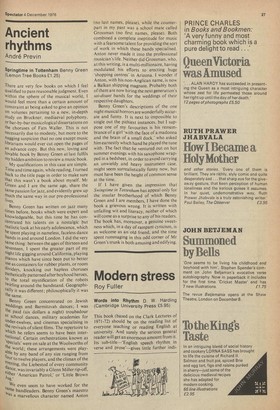Ancient rhythms
Andre Previn
Springtime in Tottenham Benny Green (Lemon Tree Books £1.25) There are very few books on which I feel qualified to pass reasonable judgment. Even Within the sphere of the musical world, I would feel more than a certain amount of constraint at being asked to give an opinion on volumes pertaining to a new, in-depth study on Bruckner, mediaeval polyphony, or bar-by-bar musicological dissertations on the choruses of Fats Waller. This is not necessarily due to modesty, but more to the nagging suspicion that no one except music librarians would ever cut open the pages of an advance copy. But this new, loving and lovable book by Benny Green at last fulfils my hidden ambition to review a music book.
My qualifications in this case are simple. lime and time again, while reading, 1 turned hack to the title page in order to make sure that this wasn't a book about myself. Mr Green and I are the same age, share the same passion for jazz, and evidently grew up much the same way in our pre-professional lives
Benny Green has written on jazz many limes before, books which were expert and knowledgeable, but this time he has concentrated his talents on a nostalgic but realistic look at his early adolescence, which he spent playing in nameless, faceless dance bands in and around London. I did the very same thing: between the ages of thirteen and seventeen, 1 spent the greater part of my night life gigging around California, playing Pianos which have since been put to better use as containers for rubber plants, or room dividers, knocking out hapless choruses Pathetically patterned after boyhood heroes, to the total mystification of the robots twirling around the bandstand. Geographically it was different ; philosophically it was the same.
Benny Green concentrated on Jewish weddings and Barmitzvah dances; I was the paid (six dollars a night) troubadour 41 school dances, military academies for under-twelves, and cinemas specialising in the.revivals of silent films. The repertoire to which he refers seems to have been inter!lational. Certain orchestrations known as tspecials' were on sale at the Woolworths of .he world; these arrangements were play`Pie by any band of any size ranging from 'our to twelve players, and the climax of the edvening, the Liebestod of every community eance, was invariably a Glenn Miller rip-off, , ther 'American Patrol,' or 'Little Brown JUg., s We even seem to have worked for the wattle bandleaders. Benny Green's maestro as a marvellous character named Anton (no last names, please), while the counterpart in my past was a school mate called Grossman (no first names, please). Both combined a complete ineptitude for music with a fearsome talent for providing the sort of work in which these bands specialised. Anton never made it into the professional musician's life. Neither did Grossman, who, at this writing, is a multi-millionaire, having modulated his efforts to erecting huge 'shopping centres' in Arizona. I wonder if Anton, with his non-Anglican name, is now a Balkan shipping magnate. Probably both of them are now hiring the next generation's soi-disant bands for the weddings of their respective daughters.
Benny Green's descriptions of the one night musical horrors are wonderfully accurate and funny. It is next to impossible to single out the pithiest instances, but I suppose one of my favourites is his remembrance of a girl 'with the face of a madonna and the brain of a small duck,' who asked him earnestly which hand he played the tune with. The fact that he ventured out on hot summer evenings with his saxophone wrapped in a bedsheet, in order to avoid carrying an unwieldy and heavy instrument case, might seem surrealistically funny now, but must have been the height of common sense at the time.
If I have given the impression that Swingtime in Tottenham has appeal only for the insular brotherhood of which Benny Green and I are members, I have done the book a grievous wrong. It is written with unfailing wit and literacy, neither of which will come as a surprise to any of his readers. The book has, moreover, a genuine sweetness which, in a day of rampant cynicism, is as welcome as an old friend, and the time spent rummaging in this odd corner of Mr Green's trunk is both amusing and edifying.






































 Previous page
Previous page